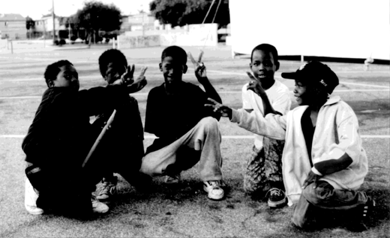The children of Harlem - all-powerful youth - are as vivid and loud as any. Their confidence and sturdiness is without rival. There is never any question as to who runs the streets. They are fresh, they run in posses. Everyone is down with someone and the group is a self-contained universe, a social unit with force and presence that obliterates all decorous conventions and pretense. This is as American youth should be. It is our expectation of the next generation that they express themselves with exuberance and self-worth, certainly not lost on any youth. Self worth! is the subtext of our educational system - failing as it does to invite anyone into the dubious meritocracy of academic scholarship - its engineering of the expectations of success is without peer. The posse replicates and expands these concepts on its own terms.

Needless to say, the black posse is without formal recognition in America the church, America the workplace and America the society. We prefer unreconstructed rugged individualism. Despite the success of de facto socialism in America the incorporated with it's benefits, team sports, team management philosophies and public ownership the black posse's collectivism seems alien. It is complicated and accentuated by the very fact that the posse's self-dedication and integrity is a practically unbreakable unit of independent and self motivated Black Power. This dynamic is shared in the public consciousness. One feels better prepared to handle one black teenager entering a jewelry store than four, more capable correcting one Japanese tourist than four. When encountering a posse, it is almost impossible to direct conversation to one in particular though that is the predisposition. A posse speaks in a circle on the sidewalk, everyone faces everyone. America's hierarchical tradition of organization building and it's corollary social constructs fail in dealing with this kind of flat organization.
Does America conspire against the black posse? One might ask as well whether or not America conspires against building houses for families with eight children. At the fundamental stage of design, the presumption is not so much against the existence of such a unit as for preferring another kind. It's lazy, prejudiced and naive. The economics of the nuclear family are already well known yet they needn't be absolute. What is weird about the living arrangement of the characters in the American production of the "Three Men..." film series. Nothing in particular, but they are at odds with certain assumptions about 'socially correct' lives. So most definitely is the black posse.
Am I angry? Who doesn't get angry?
Do I feel a responsibility of a certain type when I walk through Harlem? My first responsibility is to remove the cloak of middle class conservatism which begs the question of reconstruction by external forces. In a true recognition of African-American diversity and achievement one is able to, even through the role-model process, garner an overabundance of existential support. This has been the province of predominating Negro elites in recent history. Now the agency is held primarily by the large state-employed and growing privately employed African-American bourgeois professionals which are by and large displacing the voice of preachers, teachers, doctors of the old-school talented tenth. The temptation to signify on the marginal empowerment over the statistically dysfunctional black masses and role-model for the young is great. (rarely does Harlem stand for exactly what it is rather than for what it symbolizes - and I believe the attraction towards the significance of its towards the bourgeois do-gooders has less to do with actuality than perceived potential). In the 80s we have seen great numbers trumpet economic advancement as the crucial differentiation. In a material sense, which we never seem to lack, this makes perfect sense. Yet for the most part only a very small percentage of the black population earns or is economically more well off by an order of magnitude or more than their intended beneficiaries.
For some reason, we just can't leave the Harlem posse be. We feel we have to muck with it because it doesn't fit, and because we can. We've got a lot of nerve.